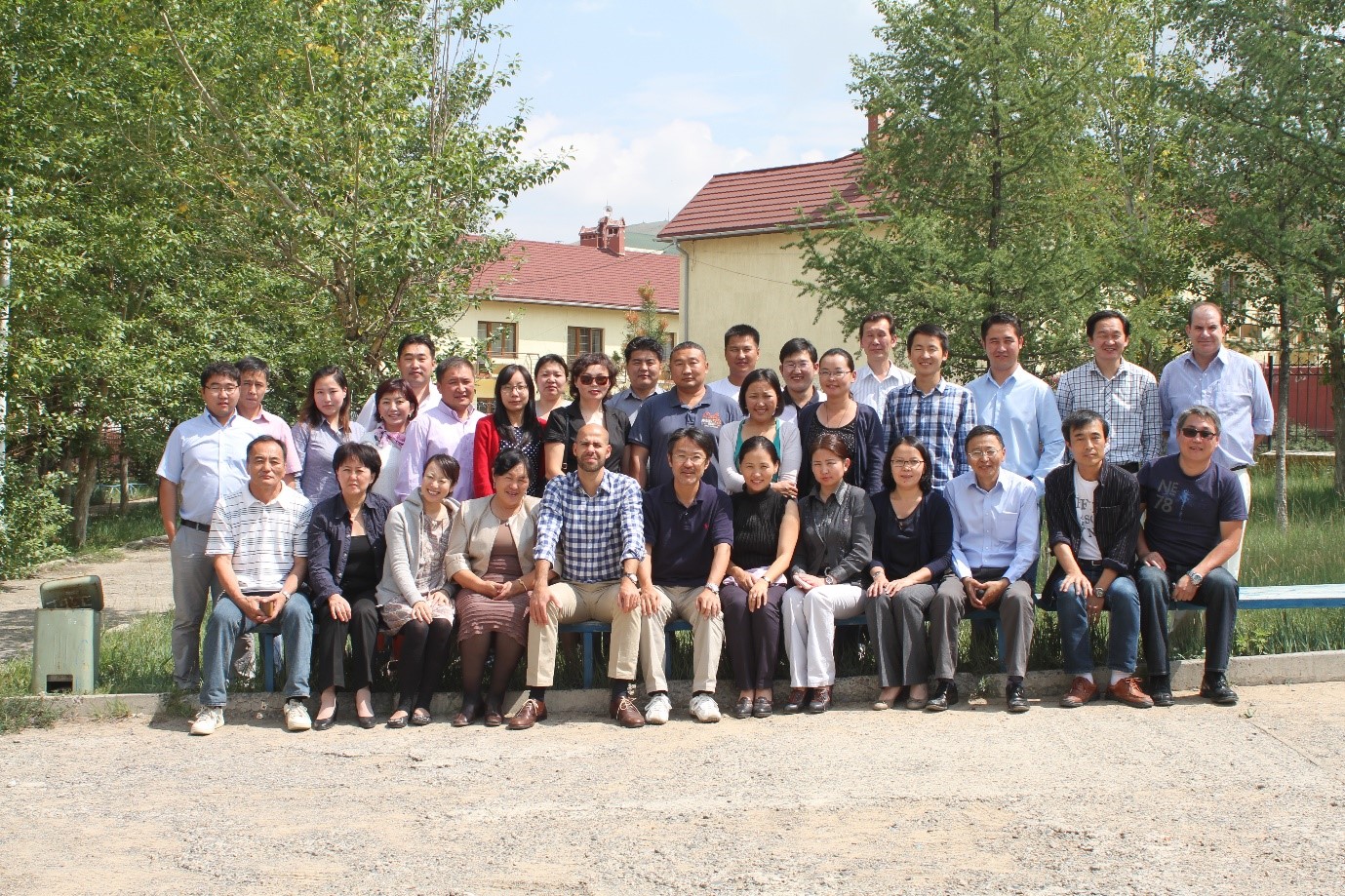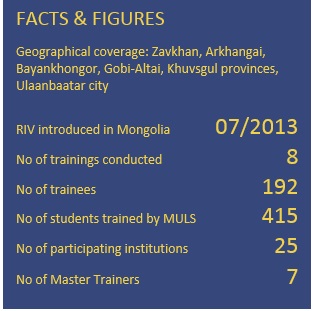Development of RuralInvest in Mongolia

The inaugural RuralInvest training at the School of Economic and Business at the Mongolian University of Life Sciences (former Mongolian State University of Agriculture) was held from 29 July to 3 August 2013. Instructors Takayuki Hagiwara and Luis Dias Pereira of the FAO Investment Centre led the training seminar. Over thirty participants from FAO and World Bank projects in Mongolia and across sectors such as universities, research institutes, and NGOs all benefitted from the unparalleled expertise of the trainers.
After fulfilling certain criteria, seven trainees were successfully certified as master trainers of the RuralInvest program in Mongolia. After this very successful first capacity building Training of Trainers (ToT) session, two more sessions were offered; on 4-5 October 2014 and then a Master Trainers session in the Spring of 2015. The October session was focused on improving key knowledge of the software and identifying and solving technical errors. The Master Trainers session included the discussion of issues in training for service providers, and the further development of the software to correct minor technical and content errors. This session also introduced the new features of the software’s latest version. The successful results of the ToT sessions and the contributions of the Master Trainers towards the improvement of the software demonstrate how much of an enormous effort that FAO Investment Centre has given towards the capacity building of RuralInvest trainers.
Mongolia now has qualified and certified trainers willing to apply the RuralInvest project toolkit in the entire region. Overall, the positive results of the trainings throughout Mongolia also demonstrate the depth, breadth, efficacy and ease of use that comprise the RuralInvest toolkit.
From 27 February until 4 March 2015, the Master Trainers and FAO’s own Integrated Livestock-based Livelihoods Support Program (ILBLSP) jointly organized the second RuralInvest training among forty-five local service providers. Through the Livestock and Agricultural Marketing Project (LAMP) and funded by the Global Agricultural and Food Security Program (GAFSP), this project offers assistance to farmers through project proposals developed by the RuralInvest toolkit in Mongolia. This training was a great achievement on several levels; the service providers enhanced their familiarity and knowledge of project development, and the trainers identified technical and translation errors in the software interface which were promptly solved by the developers, and most importantly, the LAMP initiative now approves of the investment project proposals from the trained and qualified service providers in attendance.
Next, in April 2015, the Master Trainers organized a demanding two-day RuralInvest training program for twenty-five lecturers of the School of Economic and Business at the Mongolian University of Life Sciences. The objective of the training was to introduce the RuralInvest toolkit to professionals and offer technical knowledge of the RuralInvest software.
In the Yaruu and Tsetsen-Uul counties of the Zavkhan province, two Master Trainers conducted a seminar for fifty-seven local people. Zavkhan is one of five provinces selected by the World Bank project. The three-day training consisted of intensive sessions concerning project development, RuralInvest Module 3, and the use of the software for rural farmers, individuals, field researchers, and local administrative authorities. In June 2015, the principal trainer of Rural Invest Mongolia also held a one-day training on “Non-Income Generating Projects” among thirty-five participants of the Training on Capacity Building of Officials at Veterinary Control and Monitoring Points of Mongolia. The purpose of this training was to offer theoretical and practical information on non-income generating projects that may be of use in this specific sector, i.e. a hypothetical project to improve the working conditions of state veterinary inspectors.
Introductory workshops
The goal of the introductory workshops was to disseminate information and examine the benefits of applying RuralInvest for project development among interested stakeholders.
Master Trainers in Mongolia organized one-day RuralInvest introductory workshops on two separate occasions. The first on 26 February 2014 included thirty-five participants who were officials and beneficiaries of the Swiss Agency for Development and Cooperation funded “Green Gold” Pasture Ecosystem Management Project. On 14 June 2015, fifteen educators from Otgontenger University were enthusiastic participants in the second workshop.
Mongolian University of Life Sciences: a RuralInvest hub in Mongolia
The School of Economics and Business (SEB) at the Mongolian University of Life Sciences (MULS) is key institute for teaching and developing RuralInvest in Mongolia. Three ToT sessions were organized by MULS and ILBLSP project. Five out of seven master trainers are from MULS, and they conducted all official RuralInvest trainings in Mongolia according to the specifications of the FAO Investment Centre RuralInvest package. To demonstrate the level of commitment, MULS made an in-kind contribution for the ILBLSP project by translating three books of modules, e-learning materials, and software of RuralInvest from English to Mongolian (software is already available, but publication of the books are in progress).

SEB itself has embedded RuralInvest package into the following parts of their academic programs:
- Since the 2013-2014 academic year, RuralInvest became an essential part of the undergraduate level “Project Management” course. Currently, the responsible department is updating the curriculum of the course with the assistance of RuralInvest Master Trainers.
- RuralInvest is embedded as lab work in the undergraduate level “Agricultural Economics” course since academic year of 2014-2015. In its initial year, 300 students took the course and learned the skills of developing projects using RuralInvest package according to its three modules: project identification through participatory approach, profile development, and elaborating detailed projects. The Master Trainers also supervised the lab work.
- The training internship is a university-organized program for third year students who are majoring in business administration at SEB. Previously, students hoping to complete a Bachelor’s degree in Business Economics had to write a company’s business plan. Since 2015 the requirement has been amended to develop a business plan using RuralInvest and be able to successfully defend it. During the training internship, students were given lectures and practiced the software by RuralInvest master trainers, and then continued their business plan on their own. Forty students have since completed the program.
- RuralInvest software is installed on sixty computers within three laboratories at SEB.
Application of RuralInvest in the Field
The LAMP project aims to reduce rural poverty and household food insecurity on a sustainable basis with livestock-based farming systems. The project is funded by GAFSP and supported by FAO for technical assistance. One of the components of the project is to give grants to rural projects developed by local communities with the technical assistance of service providers. RuralInvest is the perfect tool to develop and assess the feasibility of these projects. The Master Trainers conducted the training for the role of service providers and development of the project proposals in conjunction with local beneficiaries.
In the framework of LAMP project, selected beneficiaries and their respective technical service providers are developing 93 sub-projects in horticulture and animal nutrition. Upon analysis and respective approvals, the LAMP project has committed to fund 82 sub-projects (67 in horticulture and 15 in animal nutrition) worth USD1.6 million in total as of September 1, 2015. All of these sub-projects have started their field implementation. In addition, there are 35 investment proposals in animal breeding and 65 in animal health developed, assessed, and currently waiting for a project start date. (Reference: LAMP, 15 September 2015).
Further Developments
Potential developments of RuralInvest in Mongolia are seen in following respects:
- The memorandum of understanding between FAO and MULS is to be signed for applying RuralInvest in Mongolia;
- Interest on the part of the Mongolian Ministry of Finance in applying RuralInvest to developing projects and programs which would be sponsored by the Local Development Fund;
- Mongolian Ministry of Food and Agriculture in applying RuralInvest to projects financed by the Ministry.
Photo: Participants of the inaugural capacity building session, “Training of Trainers” Mongolia - 2013
Prepared by Ganzorig Gonchigsumlaa, Principal Master Trainer of RuralInvest in Mongolia
